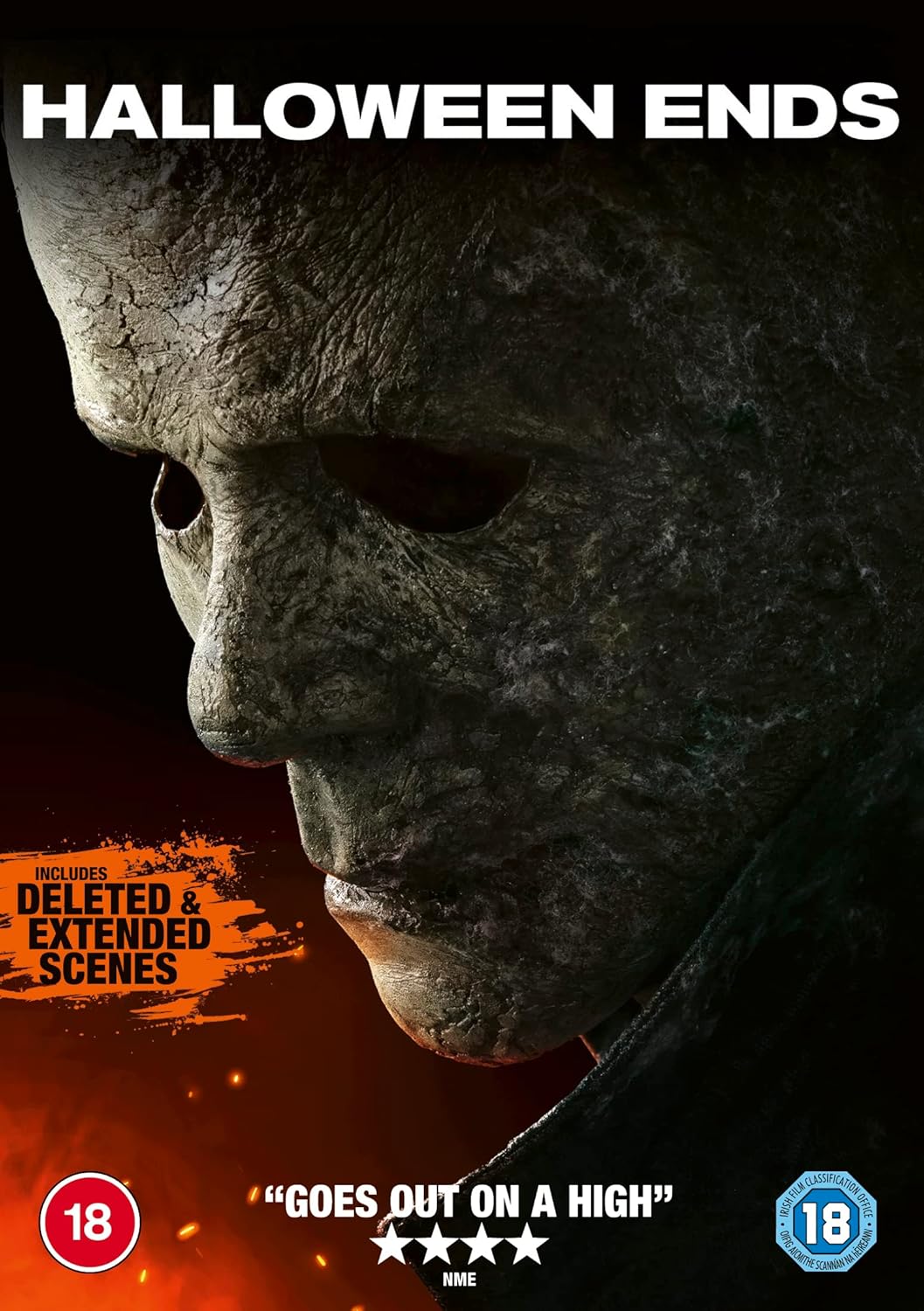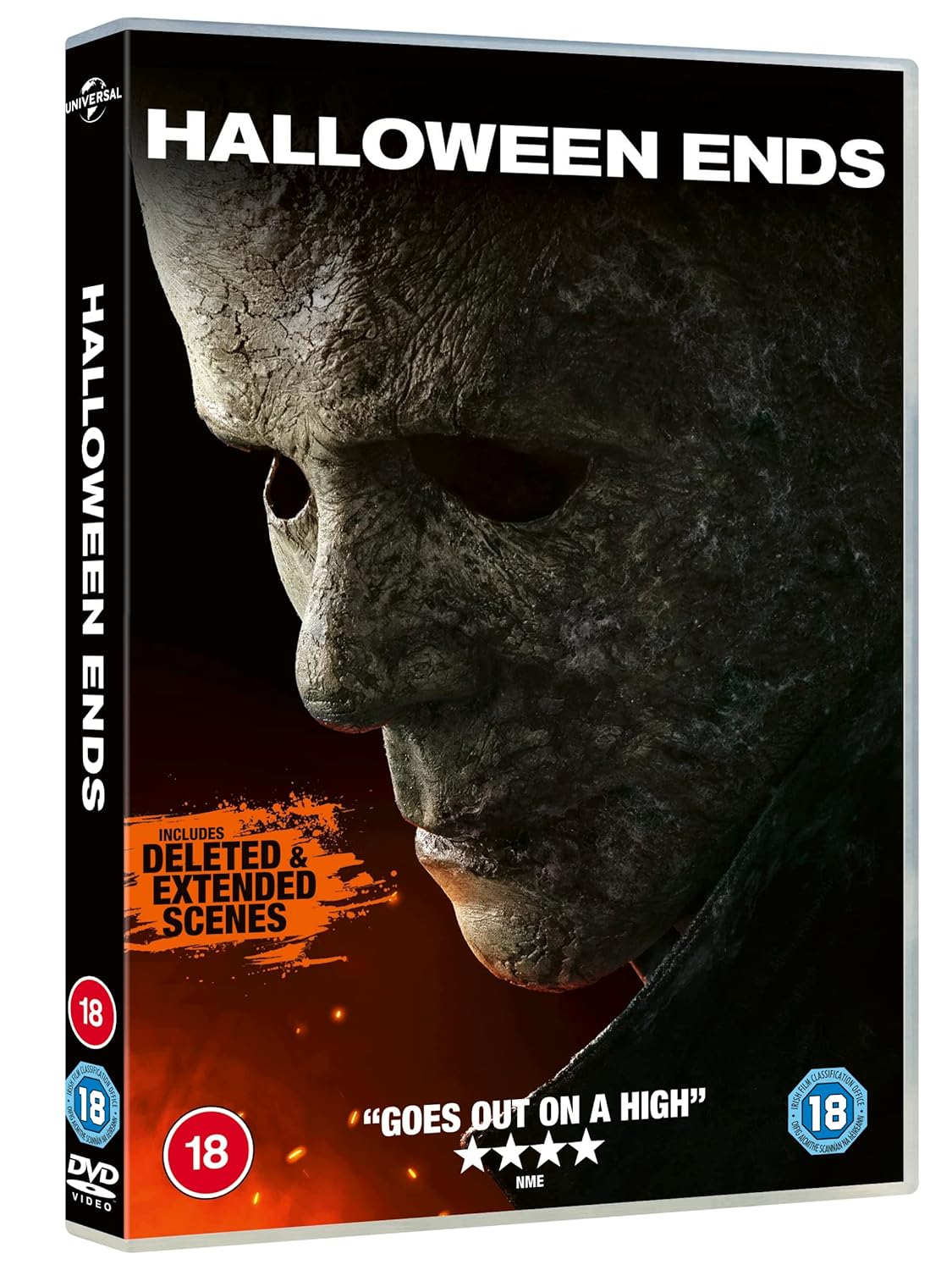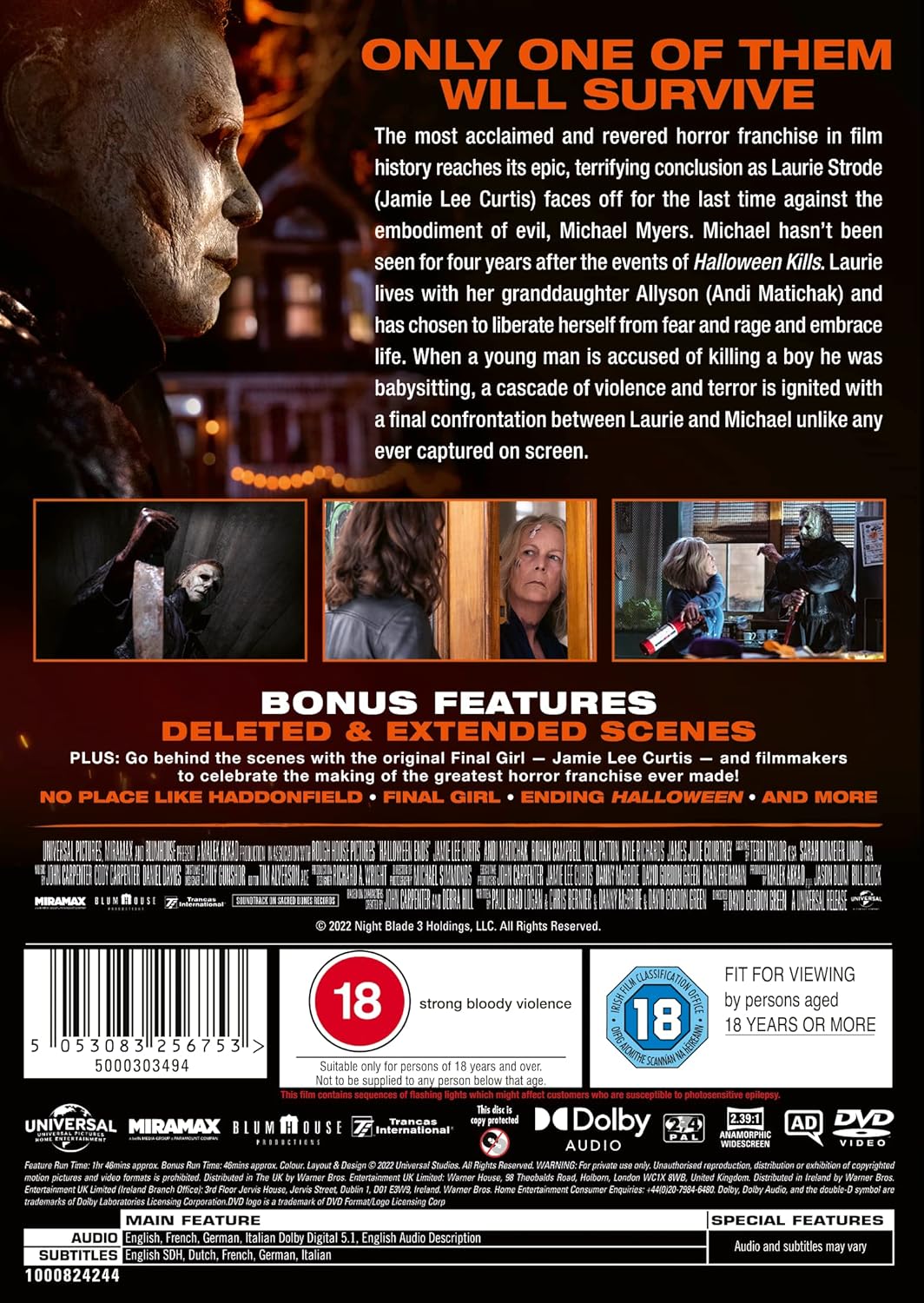
Halloween Ends Review Halloween Ends – Oemiu
Halloween Ends Review: Halloween Ends with a Whisper, Not a Scream
The night he came home. It’s a tagline that has echoed through horror history, synonymous with John Carpenter’s 1978 masterpiece, *Halloween*. Forty-four years, twelve sequels and reboots later, we arrive at what’s been billed as the final chapter: *Halloween Ends*. Director David Gordon Green, after successfully resurrecting the franchise with 2018’s *Halloween* and the divisive *Halloween Kills*, aims to conclude the Laurie Strode (Jamie Lee Curtis) and Michael Myers saga with a story that attempts to subvert expectations and explore the corrupting influence of fear. But does *Halloween Ends* truly deliver a satisfying conclusion, or does it stumble in its ambition, leaving fans feeling more bewildered than terrified?
A Different Kind of Monster Movie? The Narrative Shift in *Halloween Ends*
Immediately, *Halloween Ends* announces its departure from the established formula. Instead of a relentless, stalking Michael Myers, the film focuses on Corey Cunningham (Rohan Campbell), a young man ostracized by the Haddonfield community after a babysitting incident gone horribly wrong. Corey’s journey is one of alienation, bullying, and a slow descent into darkness. The film spends a considerable amount of time developing his character, exploring his relationship with Laurie Strode’s granddaughter, Allyson (Andi Matichak), and showcasing his encounters with the seemingly dormant Michael Myers, who is now hiding out in the sewers. This focus on Corey raises a central question: Is *Halloween Ends* truly a Halloween movie, or is it a character study disguised as one? This is a question that divides audiences. Some appreciate the attempt to move beyond the simplistic “evil man stalks good woman” trope, while others feel that it betrays the core essence of the franchise. The shift in perspective is undeniably bold, attempting to ground the mythical Michael Myers in a more tangible, societal context. The film explores the idea that evil can be born not just from innate darkness, but also from the festering fear and resentment that can consume a community. This is exemplified through the town of Haddonfield, still traumatized by the events of 1978 and 2018, and quick to find a new scapegoat in Corey. This narrative direction, while potentially interesting in its own right, inevitably leads to less screen time for Michael Myers, and a significant portion of the film feels more like a separate, albeit connected, horror story. This is especially apparent in the middle act, where the focus is almost entirely on Corey, and Michael Myers is relegated to a background presence, almost a mythical figure haunting the edges of Corey’s consciousness.
Michael Myers: A Specter of Fear or a Weakened Threat?
One of the biggest controversies surrounding *Halloween Ends* is the portrayal of Michael Myers himself. After being established as an almost unstoppable force in previous installments, he appears diminished, weakened, and surprisingly passive for a significant portion of the film. He resides in the sewers, seemingly relying on Corey to carry out his murderous acts. This portrayal clashes with the established lore of Michael Myers as the embodiment of pure evil, an unrelenting engine of death. Some argue that this weakened Michael is a metaphor for the fading power of fear in Haddonfield, or that he’s passing the torch to Corey, suggesting that evil can be transmitted and replicated. However, others find this interpretation unsatisfying, feeling that it robs Michael Myers of his iconic status. The moments when Michael does appear are often unsettling, yet there is a sense of vulnerability that was previously absent. The film attempts to humanize him, perhaps unintentionally, and this detracts from the terror he once inspired. While some might appreciate this subversion of expectations, many feel that it undermines the very essence of what makes Michael Myers such a terrifying figure. Consider how the film’s final confrontation between Laurie and Michael mirrors their original encounter in 1978, but with a crucial difference: Laurie is now prepared, empowered, and ready to face her tormentor. This shift in dynamic is intentional, signifying Laurie’s growth and resilience, but it also inadvertently weakens Michael’s impact. He is no longer the unstoppable boogeyman, but a frail, aging man facing his reckoning. This is a bold choice, but one that is sure to polarize fans.
Laurie Strode: From Victim to Vigilante, a Final Showdown
Jamie Lee Curtis delivers a powerful performance as Laurie Strode, portraying her as a woman grappling with trauma, survivor’s guilt, and a desire to finally move on. Five years after the events of *Halloween Kills*, Laurie is writing a memoir, seemingly at peace, but still haunted by the past. She takes Corey under her wing, sensing his pain and trying to guide him away from the darkness. However, her maternal instincts prove to be misplaced, and she is ultimately forced to confront the very evil she thought she had contained. The film dedicates a significant portion to Laurie’s emotional journey, exploring her relationships with Allyson and the community of Haddonfield. She becomes a symbol of hope and resilience, demonstrating the power of forgiveness and the importance of confronting one’s demons. Laurie’s evolution from victim to vigilante is a central theme of the film, and Curtis embodies this transformation with gravitas and conviction. Her final confrontation with Michael Myers is both brutal and cathartic, representing the culmination of a lifetime of fear and trauma. This showdown is not just a physical battle, but a psychological one, with Laurie finally gaining the upper hand and reclaiming her agency. While some argue that the focus on Laurie overshadows Michael Myers, it is undeniable that her character arc is one of the most compelling aspects of *Halloween Ends*. She embodies the spirit of survival, demonstrating that even in the face of unimaginable horror, it is possible to find peace and closure. This concluding chapter offers Laurie a sense of resolution, a chance to finally break free from the cycle of violence that has defined her life. The narrative emphasizes her strength, her intelligence, and her unwavering determination to protect those she loves, solidifying her legacy as one of horror’s most iconic and enduring heroines.
The Verdict: Does *Halloween Ends* Stick the Landing?
Ultimately, *Halloween Ends* is a divisive film that is likely to leave many fans feeling conflicted. While it attempts to subvert expectations and explore complex themes, it also deviates significantly from the established formula of the franchise. The focus on Corey Cunningham dilutes the presence of Michael Myers, and his portrayal as a weakened figure is likely to disappoint many. However, Jamie Lee Curtis delivers a compelling performance as Laurie Strode, and her character arc provides a satisfying sense of closure. The film also explores the corrupting influence of fear on a community, offering a commentary on societal trauma and the search for scapegoats. Whether *Halloween Ends* is a successful conclusion to the saga is a matter of personal opinion. Some will appreciate its ambition and its willingness to take risks, while others will feel that it betrays the core essence of the *Halloween* franchise. This final chapter of the David Gordon Green trilogy certainly offers a different take on the story of Michael Myers and Laurie Strode. This fresh perspective is ultimately the most polarizing aspect of the film and a key consideration when thinking about *Halloween Ends movie* as a whole. It feels less like a traditional slasher film and more like a character study with elements of horror, and, as such, it will likely alienate those expecting non-stop action and gore. The *Halloween Ends ending* may be viewed by some as anticlimactic while others will deem it fitting and poetic. The *Halloween Ends cast*, especially Jamie Lee Curtis and Rohan Campbell, delivered strong performances and embodied their characters. Despite its flaws, *Halloween Ends* is a thought-provoking and ultimately unforgettable film, but the *Halloween Ends 2022* release may be best received by those open to a departure from the classic slasher formula. The final chapter invites viewers to reflect on the nature of evil, the power of resilience, and the enduring legacy of Laurie Strode.
| Aspect | Halloween (1978) | Halloween Ends (2022) |
|---|---|---|
| Focus | Relentless stalking of Michael Myers | Exploration of societal trauma and a new protagonist |
| Michael Myers’ Portrayal | Unstoppable, embodiment of pure evil | Weakened, potentially passing the torch |
| Laurie Strode’s Role | Final girl, victim fighting for survival | Survivor, seeking closure and confronting her past |
| Tone | Suspenseful, terrifying | Psychological, reflective |
| Overall Reception | Universally acclaimed | Divisive, polarizing |
FAQ
What is *Halloween Ends* about?
*Halloween Ends* is the final installment in the David Gordon Green trilogy, which serves as a direct sequel to John Carpenter’s original *Halloween* (1978). The film picks up four years after the events of *Halloween Kills*. The story primarily revolves around Corey Cunningham, a young man ostracized by the community after a tragic accident. As Corey descends into darkness, he encounters the seemingly weakened Michael Myers, leading to a series of events that ultimately pit Laurie Strode against her lifelong tormentor in a final, definitive showdown. The film explores themes of societal trauma, the corrupting influence of fear, and the resilience of the human spirit in the face of unimaginable evil. It is, at its core, a story of a community dealing with the aftermath of tragedy and searching for someone to blame.
How does *Halloween Ends* differ from previous Halloween movies?
*Halloween Ends* distinguishes itself from previous *Halloween* films through its narrative focus and portrayal of Michael Myers. Unlike the relentless stalking and slasher-focused approach of many prior installments, *Halloween Ends* dedicates significant screen time to exploring the character of Corey Cunningham and the psychological impact of trauma on the community of Haddonfield. This shift in perspective results in less screen time for Michael Myers and a more subdued portrayal of his character. He appears weakened and almost reliant on Corey, a stark contrast to the unstoppable force he was in previous films. Additionally, the film places a greater emphasis on Laurie Strode’s emotional journey and her attempts to move on from the past, making it a more character-driven and thematically complex entry in the franchise.
Why is Michael Myers portrayed as weak in *Halloween Ends*?
The weakened portrayal of Michael Myers in *Halloween Ends* is a deliberate choice by the filmmakers, intended to subvert expectations and explore new dimensions of the character. One interpretation is that his diminished power reflects the fading influence of fear in Haddonfield, as the community slowly begins to heal and move on. Another perspective is that Michael is passing the torch of evil to Corey, suggesting that evil can be transmitted and replicated. This interpretation ties into the film’s thematic exploration of societal trauma and the corrupting influence of fear on a community, leading it to create scapegoats. This direction makes the movie about more than just a masked killer. It also allows the film to examine the complex relationship between Michael Myers, Laurie Strode, and the town of Haddonfield.
Is *Halloween Ends* a satisfying conclusion to the franchise?
The satisfaction derived from *Halloween Ends* as a conclusion to the franchise is highly subjective and depends on individual expectations. Fans expecting a traditional slasher film with relentless Michael Myers kills may be disappointed by the film’s focus on character development and thematic exploration. However, those who appreciate a more nuanced and thought-provoking approach to the genre may find the ending satisfying. The film provides closure to Laurie Strode’s character arc, offering her a chance to confront her trauma and find peace. However, the divisive portrayal of Michael Myers and the controversial narrative choices may leave some fans feeling underwhelmed. Ultimately, whether *Halloween Ends* is a successful conclusion is a matter of personal opinion and depends on one’s willingness to embrace its unconventional approach.
How does Laurie Strode’s character evolve in *Halloween Ends*?
Laurie Strode undergoes a significant transformation in *Halloween Ends*, evolving from a traumatized survivor to a woman seeking closure and healing. Five years after the events of *Halloween Kills*, Laurie is attempting to rebuild her life and move on from the past. She is writing a memoir, trying to make peace with her experiences, and providing support to her granddaughter, Allyson. Laurie also displays a surprising degree of empathy towards Corey Cunningham, recognizing his pain and attempting to guide him away from the darkness. Her final confrontation with Michael Myers represents the culmination of her journey, as she finally confronts her tormentor and reclaims her agency. This allows Laurie to be a strong role model and showcase the ability to get better after a tragedy. The film emphasizes her resilience, her intelligence, and her unwavering determination to protect those she loves, solidifying her legacy as one of horror’s most iconic heroines.
What are the main themes explored in *Halloween Ends*?
*Halloween Ends* explores several complex themes, including societal trauma, the corrupting influence of fear, and the search for scapegoats. The film examines the impact of Michael Myers’s actions on the community of Haddonfield, highlighting the lingering fear and paranoia that permeates the town. It suggests that evil can be born not just from innate darkness, but also from the festering resentment and distrust that can consume a community. The film also explores the theme of resilience, showcasing Laurie Strode’s journey from victim to survivor and her ultimate triumph over evil. Furthermore, it touches upon the themes of forgiveness and redemption, as Laurie attempts to guide Corey Cunningham away from the darkness and towards a better path. This shows that the film is not just about the violence, but also about the psychological and emotional scars left on those involved.
Was there ever an alternate *Halloween Ends ending* considered?
While specific details about alternate endings have not been widely released, it’s common in film production for multiple endings to be considered and even filmed. Given the divisive nature of the theatrical release, it’s highly probable that alternative versions of the final confrontation between Laurie and Michael, and the fate of Corey Cunningham, were explored. The decision to portray Michael as weakened and to focus on Corey’s descent into darkness was a significant creative choice, and it’s plausible that other avenues were considered before settling on the final cut. Directors and writers often experiment with various possibilities to find the most impactful and thematically resonant conclusion to a story. The final *Halloween Ends* movie ending, with its particular choices, shows a level of dedication to a particular vision for the conclusion to the saga.








